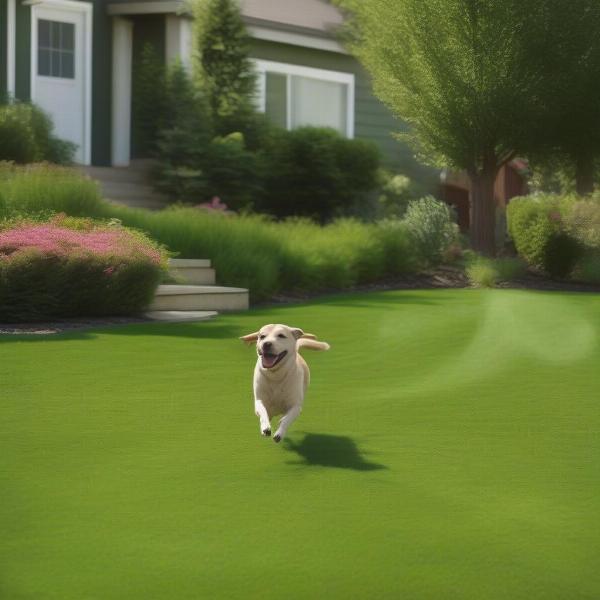Dog rocks are small, porous rocks marketed as a natural way to prevent burn marks on lawns caused by dog urine. But what do vets really think about their effectiveness and safety? This article delves into the science behind dog rocks, explores veterinary opinions, and provides practical advice for maintaining a healthy lawn while ensuring your dog’s well-being.
Dog rocks claim to work by altering the chemical composition of dog urine, reducing nitrates and making it less likely to scorch grass. The rocks are placed in a dog’s water bowl, where they supposedly filter out impurities. But is this claim supported by scientific evidence? Many vets remain skeptical. While anecdotal evidence exists, rigorous scientific studies demonstrating the efficacy of dog rocks are lacking.
Do Dog Rocks Really Work? Veterinary Perspectives
Many veterinarians question the scientific basis for dog rocks. The primary concern is the lack of conclusive evidence demonstrating their effectiveness. Some studies have shown minimal impact on urine nitrogen levels, which is the main culprit behind lawn burn. Furthermore, the mechanism by which dog rocks are supposed to work – ion exchange – raises questions about the potential alteration of the dog’s mineral intake.
Veterinarians often recommend addressing lawn burn through other methods, such as diluting the urine by encouraging the dog to drink more water or training the dog to urinate in a designated area of the garden. Proper lawn care, including regular watering and fertilization, can also help mitigate the effects of dog urine.
Are Dog Rocks Safe for Dogs?
While generally considered non-toxic, the safety of dog rocks for long-term use is still debated among veterinarians. Some worry about the potential for mineral imbalances if the rocks significantly alter the dog’s water mineral content. It’s crucial to monitor your dog for any changes in health or behavior if using dog rocks.
Alternatives to Dog Rocks for Lawn Care
Several effective alternatives to dog rocks can help prevent lawn burn. These include:
- Increased water intake: Encouraging your dog to drink more water will dilute the urine and reduce its nitrogen concentration.
- Designated potty area: Training your dog to urinate in a designated area, such as a gravel patch or a section of the garden with hardy plants, can protect the rest of your lawn.
- Lawn care practices: Regular watering and fertilization can help your lawn recover from urine damage more quickly. Specific lawn repair products are also available.
- Dietary supplements: Some supplements claim to neutralize the nitrogen in dog urine, but consult your veterinarian before adding any supplements to your dog’s diet.
 Healthy Green Lawn with a Dog
Healthy Green Lawn with a Dog
Conclusion
While dog rocks are marketed as a simple solution for lawn burn, their effectiveness remains scientifically unproven. Many veterinarians recommend exploring alternative methods for protecting your lawn while prioritizing your dog’s health. Consulting your vet is always the best approach to ensure you’re making informed decisions about your pet’s well-being.
FAQ
- Do dog rocks actually work? There is limited scientific evidence to support the claim that dog rocks effectively prevent lawn burn.
- Are dog rocks safe for my dog? While generally considered non-toxic, long-term effects are still under debate. Consult your vet before using them.
- What are some alternatives to dog rocks? Increasing water intake, designating a potty area, proper lawn care, and dietary supplements are viable alternatives.
- Should I consult my vet about using dog rocks? Yes, it’s always recommended to discuss any changes to your dog’s diet or water with your veterinarian.
- How can I encourage my dog to drink more water? Try using a water fountain, adding flavoring to their water (like bone broth), or placing multiple water bowls around the house.
- What type of lawn care helps prevent urine burn? Regular watering, fertilization, and using lawn repair products can help mitigate urine damage.
- Are there any dietary supplements that can help with lawn burn? Yes, but consult your veterinarian before adding any supplements to your dog’s diet.
ILM Dog is a leading international dog care website dedicated to providing expert advice on all aspects of dog ownership, from breed selection and puppy care to senior dog care and travel tips. We offer reliable, practical information to help you provide the best possible care for your canine companion. For expert advice on dog health, nutrition, training, grooming, and more, visit ILM Dog. Contact us at [email protected] or +44 20-3965-8624.